The LG G4 Review
by Joshua Ho on July 30, 2015 10:00 AM EST- Posted in
- Smartphones
- Qualcomm
- LG
- Mobile
- Snapdragon 808
- LG G4
Snapdragon 808
In configuring the G4, LG (and recently Motorola) have broken away from the pack in terms of SoC choice, electing to use Qualcomm’s Snapdragon 808. This makes the G4 the first flagship phone to launch with the 808 as its SoC, and the first phone overall that we have reviewed with the 808 as well.
For those that are unfamiliar with this SoC, I would refer to our previous coverage on the Snapdragon 808. In short, the Snapdragon 808 is effectively a simpler SoC than the Snapdragon 810, with two CPU cores on the big cluster instead of four, a more mature LPDDR3 memory controller, a smaller GPU, and some general reduction in features and complexity in some aspects like the ISP and video encode blocks.
| Qualcomm's Snapdragon 810 and 808 | ||||
| Snapdragon 810 | Snapdragon 808 | |||
| Internal Model Number | MSM8994 | MSM8992 | ||
| Manufacturing Process | 20nm | 20nm | ||
| CPU | 4 x ARM Cortex A57 + 4 x ARM Cortex A53 (big.LITTLE) | 2 x ARM Cortex A57 + 4 x ARM Cortex A53 (big.LITTLE) | ||
| ISA | 32/64-bit ARMv8-A | 32/64-bit ARMv8-A | ||
| GPU | Adreno 430 | Adreno 418 | ||
| H.265 Decode | Yes | Yes | ||
| H.265 Encode | Yes | No | ||
| Memory Interface | 2 x 32-bit LPDDR4-1600 | 2 x 32-bit LPDDR3-933 | ||
| Integrated Modem | 9x35 core, LTE Category 6/9, DC-HSPA+, DS-DA | 9x35 core, LTE Category 6/9, DC-HSPA+, DS-DA | ||
| Integrated WiFi | - | - | ||
| eMMC Interface | 5.0 | 5.0 | ||
| Camera ISP | 14-bit dual-ISP | 12-bit dual-ISP | ||
| Shipping in Devices | 1H 2015 | 1H 2015 | ||
Meanwhile to understand why four cores is not immediately better than two cores - and thus why Snapdragon 808 is not as big of a difference from Snapdragon 810 as it may first seem - it's important to understand Amdahl's law, which is pretty simple once you think about it. In short, for a given workload if a certain percentage is inherently single-threaded, no matter how many cores you throw at the problem you will eventually rearch a point where you are solely limited by how fast the single-threaded portion (critical section) of the code will run, and the returns diminish with each core you throw at the problem. It turns out that people in general are really bad at thinking in a parallel manner anyways, so writing code that actually takes advantage of multiple cores is generally difficult and as a result a lot of applications will leave much of the work on a single thread anyways, so the third and fourth cores of a CPU can go relatively unused in some situations.
In the specific case of the Snapdragon 808 and Snapdragon 810, the differences between the SoCs' CPU blocks are definitely bigger than just a case of lopping off cores from a die. As a result the actual power consumed for a single core at a given frequency isn't guaranteed to be the same. There's definitely overhead involved in wiring up additional cores, so product design has to balance core count with core complexity.
System Performance
When it comes to smartphones, there’s a sort of hierarchy of needs when it comes to establishing a great user experience. If you follow this down to the base, the foundation that everything rests upon is the hardware. Within the somewhat nebulous area of hardware, there are a number of key drivers for app performance in the hardware. These areas include the SoC and eMMC/NAND. DRAM is also a key factor, but this is often hard to perceive as so much of a modern PC is designed specifically to hide the relatively high latency and low bandwidth of DRAM.
In order to try and get a holistic view of a smartphone, we run a suite of benchmarks ranging from Javascript/HTML5 browser tests to system API performance benchmarks like PCMark to attempt to get a good feel for whether a smartphone will perform well, in conjunction with subjective performance observations from day to day use.
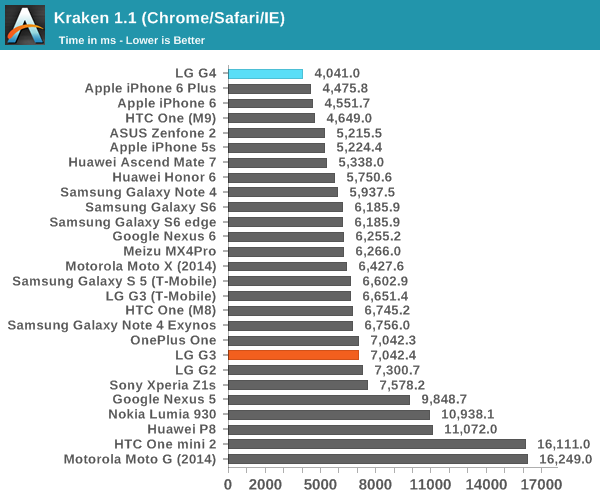
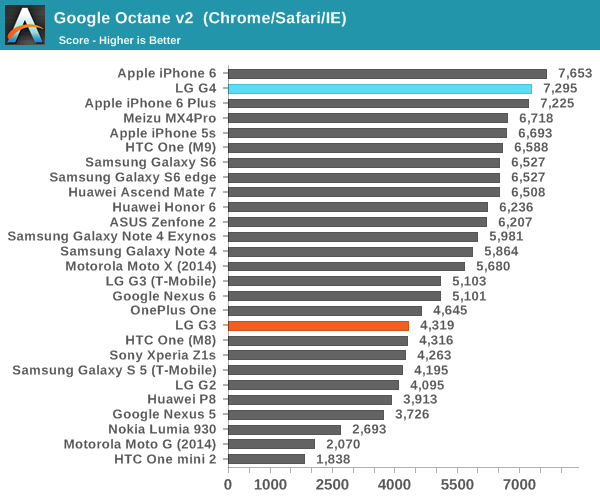
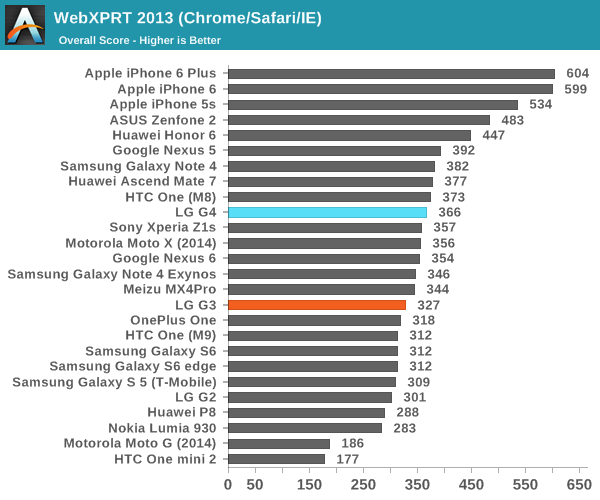
As we can see here, it looks like the combination of the Snapdragon 808 SoC and some work on LG/Qualcomm's part with optimizations for Chrome produces some pretty stunning results in Kraken and Octane. I suspect at least part of this is better optimization at the SoC level for the Cortex A57 in the Snapdragon 808/general software optimization, and at least partly optimizations designed to improve scores in those benchmarks as performance is noticeably more mixed in WebXPRT 2013. At any rate, web browsing performance is consistently good with the G4 and even intensive sites scroll smoothly.
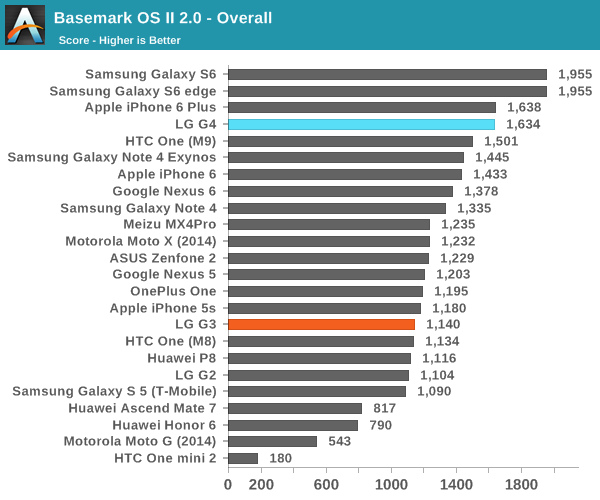
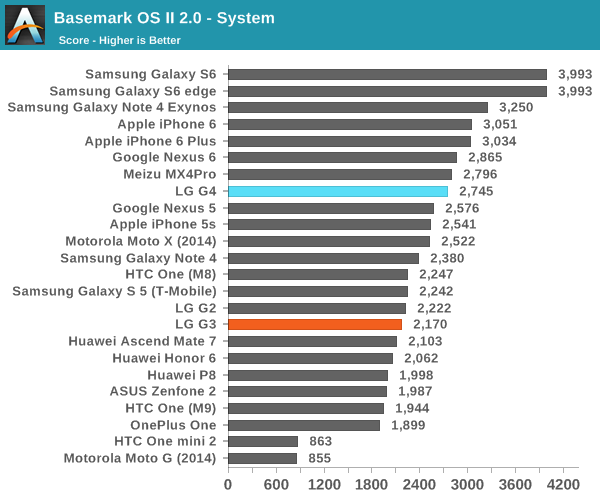
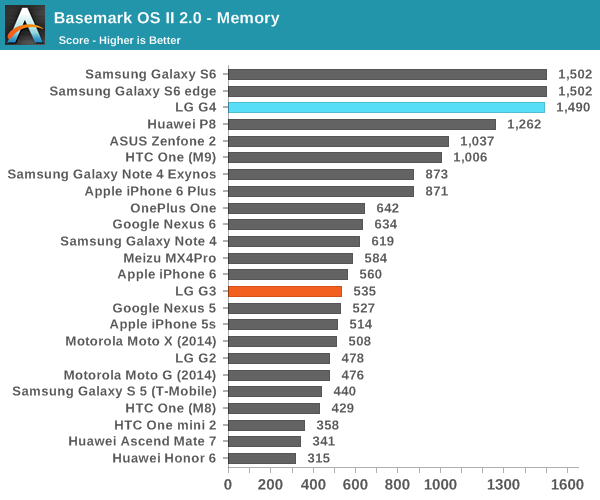
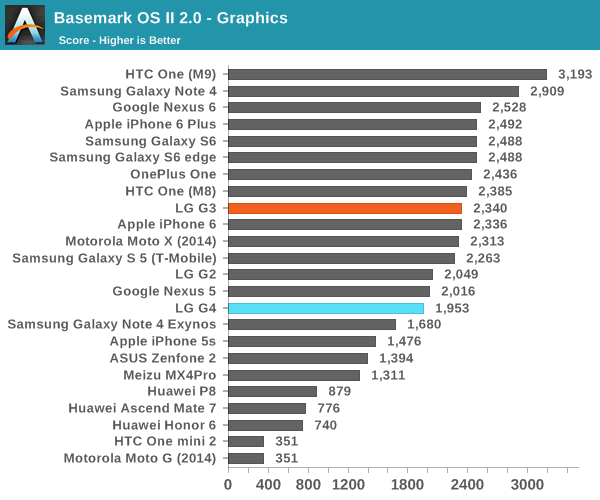
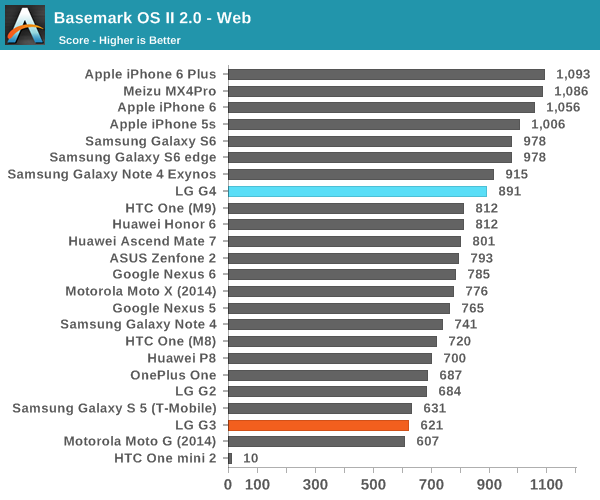
Once again, we see a noticeable performance uplift relative to the Snapdragon 810 devices that we've tested. It seems that LG has made a solid judgment call when they decided to use Snapdragon 808 instead of 810. However, despite this we see that the LG G4 trails behind the Galaxy S6 in terms of performance, which is due to the lower GPU score here which is closer to the Snapdragon 800 than Snapdragon 805.
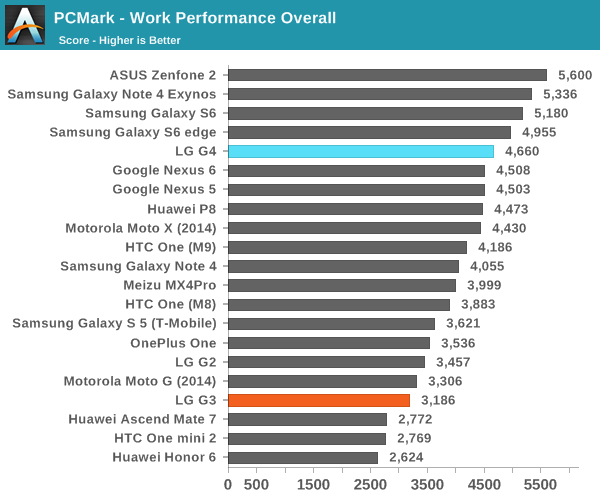
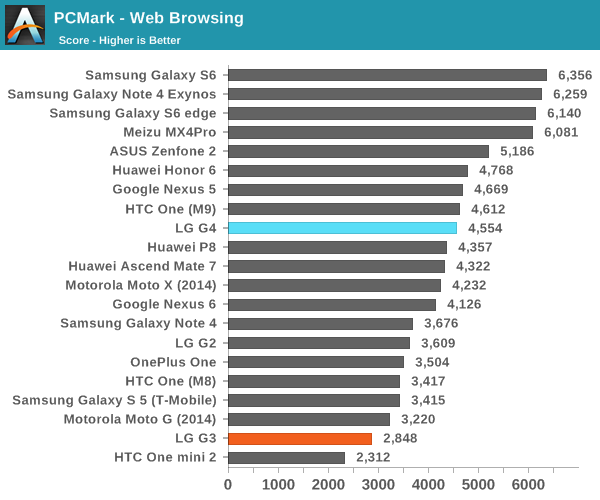
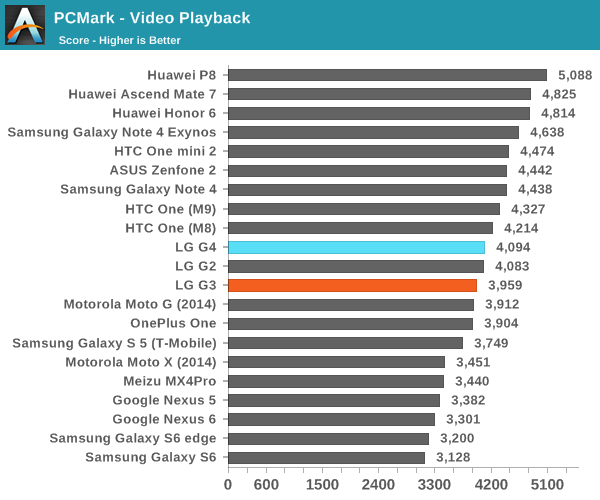
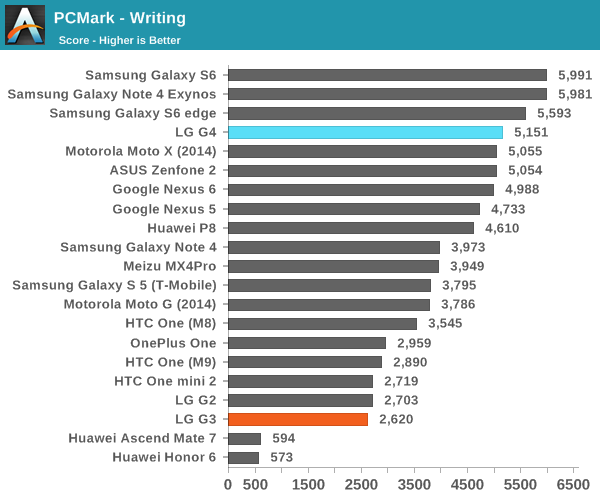
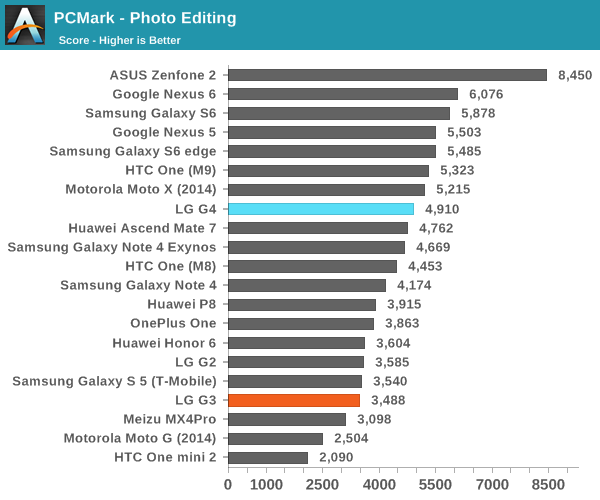
Once again, we see that the G4 performs quite strongly in these general purpose benchmarks, which to some extent affirms that more cores aren't necessarily better, as core count alone really fails to describe significant differences between SoCs. With a combination of the Snapdragon 808 SoC and better software optimization, it seems that LG has made a phone that can perform everyday tasks better than Snapdragon 810 devices, although it still falls short when compared to something like the Galaxy S6.










84 Comments
View All Comments
bleached - Sunday, August 2, 2015 - link
http://www.dxomark.com/Mobiles/Column-right/Mobile...Arcetnathon - Wednesday, August 5, 2015 - link
You point something really strange.Each review of tech website published month after release is worst than first tests.
Maybe big company doesn't play fair and send very specific smartphone that will never be in store...
akdj - Thursday, August 6, 2015 - link
As an owner of three of the top 5; S6, Note 4, & indeed... The iPhone 6+, which raps the 'top 5' "Apples is (sic) 'rate' in the top five'The 6+ is indeed produced by Apple ...my subjective feelings are almost identical to Josh's. S6 Edge is an incredible camera. I love it. My Note 4 always has been, with micro SD it makes shooting 4k practical, but my low light shots are pretty sad in comparison to the 6+, as well as 'action' or fast moving shots. S6 shoots 4k, excellent 1080p, but the video stabilization and 60fps-240fps adjustments on the iPhone tump the other two, and I'm just realizing I've placed my response after the wrong reply of your dxo link.
It's saying damn near what Josh concluded. DxoMark is specific to still photography, heavy on resolution and to those ends the sensors in the S6, N4 & G4 indeed play in the same field as the iPhone ...and in some cases beat it. That said, for simplicity point and shoot and nearly every time get an excellent shot without latency or buffering, the iPhone is hard to beat. Without G4 experience I'll hold judgement, but for video, the iPhone is it. For stills, I'm partial now to my S6 and the Note 4 has always been phenomenal
Apple opening their 'souls' a bit with the ability to interact with the SoC ala their native apps, there are plenty of manual control, high resolution shooters (using the 8 megapixel, 4K sensor and its speed) as well as slow motion and video editing tools --- probably the biggest weight in the iphone's favor is the App Store, it's amazing selection of editing and shooting tools as well as continuous updates might just top the subjective list of top 5.
*i don't own a 4K TV but I've got the ability to playback 4K on my MacBook Pro -- looks amazing but it's limited in length of time you can shoot and heats the camera up nice and warm. The S6, all around, my favorite for everything and now my go to camera in most situations. It's smaller and easier to shoot --- but for video capture, my son playing baseball, or last weeks Mötley Crüe show, the iPhone and it's incredible stabilization, video processing and iCloud uploading, ....see where I'm going?
I own a business, have for two decades and with a dozen employees equipped with their choice, I pay for them ...and have iPhone as a personal - S6 personal and Note4 business only. Primarily the stylus and autographs for credit cards has a cool vibe with clientele. You mileage may vary but dxo mark scores in the mid 80s rivals and defeats many point and shoot cams under $300. A point or two difference isn't real world, nor the bible on what to buy. Iphone is ranked 5 & 6 (+ & standard) - can't seem to find the Experia in America and their separation of a couple points in the mid 80as -- without considering motion at all, I'm not sure ANY is the wrong choice and for many that don't want manual control, the iPhone with HDR is hands down the layman's favorite. Android, I'm with the S6, double tap home button to pop the cam and it's rare even as a DSLR shooter that I'm adjusting settings, modes or manually selecting ISO, Aperture or shutter speed
S6 Edge, I love it. 6+, love it. Note 4, still awesome - bit heavier but easily used now with experience and the right case
Take motion into the equation and the limitations on 4K, post processing there of and playback ...I think this is the reason Apple has put this much effort into their sensor as it's the perfect 'size' for non cropped, full sensor 4K shooting
Maybe I'm confused, but I'm ambidextrous, love both and have owned both since 07/08. Dxomark is a silly geek site for resolution of serious optics. Those scores and their differential is hardly a 'win' for any flagship mentioned
J
Pissedoffyouth - Thursday, July 30, 2015 - link
How does the handoff between clusters cope compared to the 810? Does it scale from 2>4 cores when stepping down, averaging the load across the A53 cluster?nikaldro - Thursday, July 30, 2015 - link
The S808 throttles about as much as the exynos 7420.nikaldro - Thursday, July 30, 2015 - link
The S808 throttles about as much as the exynos 7420.grayson_carr - Thursday, July 30, 2015 - link
My God. I thought this review would never come. I already lusted after the G4, bought the G4, owned the G4 for a while, and then bought a Nexus 6 to replace it haha. Still, it will be good to know the Snapdragon 808 lowdown seeing as the Moto X 2015 and Nexus 5 2015 will make use of it.ThisIsChrisKim - Thursday, July 30, 2015 - link
I bought the G4 and I'm really liking it--camera is just superb. UI is meh, but not annoying enough for me to get something else.Nice seeing this review, nonetheless!
grayson_carr - Thursday, July 30, 2015 - link
I liked the G4 (maybe even more than the Galaxy S6 I owned before it), but there were a couple minor annoyances that ultimately led me to buy a Nexus 6. I found that the G4 performed well most of the time, but as mentioned in the review, in some apps it would drop frames more often than the previous two phones I owned (Nexus 5 and Galaxy S6). Also, the touchscreen seemed to be less responsive than the previous phones I owned, which started to get on my nerves. Finally, there were a couple software annoyances like the inability to expand notifications in some circumstances, that were bothering me. I did like the screen on the G4 better than the Galaxy S6 and Nexus 6, and the manual camera controls were boss, but ultimately I prefer the Nexus software experience.Fitnesspro - Thursday, July 30, 2015 - link
Grayson. You are right. Speed and battery count. I liked the G4 specs but was disappointed when tried the phone out at T Mobile. Has a snag and the actual screen id not